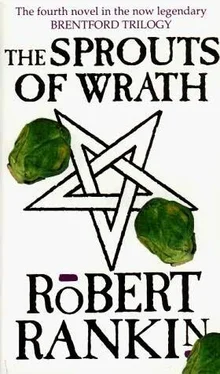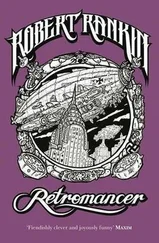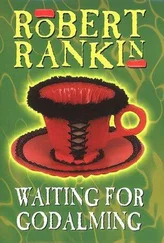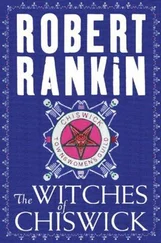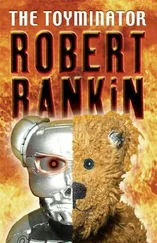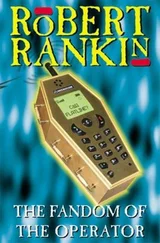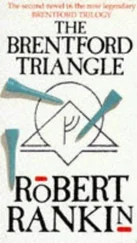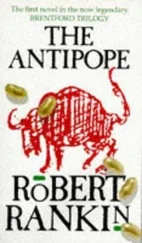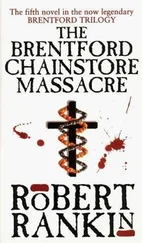Robert Rankin - The Sprouts of Wrath
Здесь есть возможность читать онлайн «Robert Rankin - The Sprouts of Wrath» весь текст электронной книги совершенно бесплатно (целиком полную версию без сокращений). В некоторых случаях можно слушать аудио, скачать через торрент в формате fb2 и присутствует краткое содержание. Год выпуска: 1988, Жанр: Юмористическая фантастика, на английском языке. Описание произведения, (предисловие) а так же отзывы посетителей доступны на портале библиотеки ЛибКат.
- Название:The Sprouts of Wrath
- Автор:
- Жанр:
- Год:1988
- ISBN:нет данных
- Рейтинг книги:4 / 5. Голосов: 1
-
Избранное:Добавить в избранное
- Отзывы:
-
Ваша оценка:
- 80
- 1
- 2
- 3
- 4
- 5
The Sprouts of Wrath: краткое содержание, описание и аннотация
Предлагаем к чтению аннотацию, описание, краткое содержание или предисловие (зависит от того, что написал сам автор книги «The Sprouts of Wrath»). Если вы не нашли необходимую информацию о книге — напишите в комментариях, мы постараемся отыскать её.
The Sprouts of Wrath — читать онлайн бесплатно полную книгу (весь текст) целиком
Ниже представлен текст книги, разбитый по страницам. Система сохранения места последней прочитанной страницы, позволяет с удобством читать онлайн бесплатно книгу «The Sprouts of Wrath», без необходимости каждый раз заново искать на чём Вы остановились. Поставьте закладку, и сможете в любой момент перейти на страницу, на которой закончили чтение.
Интервал:
Закладка:
Jennifer scanned a newspaper column or two and nodded in complete approval. Fleet Street was already in a hot flush of patriotic fervour. The disasters of Birmingham were already forgotten. Tomorrow belonged to Brentford.
Amongst the papers lay a large metallic foil envelope which had arrived by special delivery that very morning. Jennifer placed her coffee cup amongst the Sundays and opened it. It contained a sheaf of computer print-outs and a cheque raised in her name to a sum amply sufficient to her current needs. Jennifer examined the signature with keen interest but she could make nothing of it; it was more like a runic symbol. The designer of the great stadium, inventor of Gravitite and financier of the Brentford Olympics was still as much a mystery to her as to everyone else.
Hers not to reason why. Jennifer consulted the print-out. It was a schedule of her duties for the coming week, listing meetings to be arranged, statements to be given, to whom and at when. The names of certain luminaries in the fields of art, literature, the sciences and the media appeared. Their support, considered essential to the overall success of the project, was to be enlisted. And the wherewithal by which this might be achieved was all there, printed in slim computer-type.
Anticipating possible difficulties with local ecologists, traditionalists, reactionaries and other spoilsports, it was considered prudent to bring forward the schedule of works by a day. Work on the five sites would begin at once.
Jennifer shook her beautiful head, lost in admiration for the mysterious organizer. The insight and perception displayed held her in fascination. Ever since her first involvement with the project she had felt a dull pain gnawing away at her insides, a hunger pang which could only be satisfied by one thing. Somehow, someway, she had to meet this person whose genius obsessed her. Somehow, someway, their paths must be made to cross. And then we should see what we should see.
Reverently she turned the page of the print-out and noted to her further wonder a list entitled: DISSENTERS: CLASS A SECURITY RISKS. Below this encircled in red, were only two names, yet two she knew almost as surely as she knew her own: James Arbuthnot Pooley and John Vincent Omally.
The two dissenters were enjoying a hearty breakfast. They had bathed, slept soundly and now sat in their newly laundered clothes enjoying a magnificent spread in the Professor’s dining room.
Gammon, the Professor’s elderly retainer, removed the silver dome from the crumpet dish and asked, “Is everything to your satisfaction, gentlemen?”
“Oh, indeed yes.” Pooley wiped a napkin across his mouth and prepared himself for an assault upon the crumpets.
Omally sipped coffee and watched the Professor from the corner of his eye. Something was coming, that was for sure. All this ill-deserved hospitality, what was the old man up to?
“And now,” said the Professor, as if in answer to John’s unasked question, “I am going to tell you both exactly how you can repay my hospitality.” Omally turned his coffee cup between his fingers, Jim kept right on eating. “You are both going to change your ways,” said the Professor. “Dishonesty and duplicity are now but regretful chapters in your dual history. Altruism is now your watchword. Good works will be the standard by which others shall judge you. Honest toil your daily lot.”
“Your colloquy is as ever eloquent,” replied John. “The points are both well made and well taken, we shall watch our ps and qs from now on.”
“You will,” said the Professor. “Your behaviour will be exemplary.”
“Be sure of that,” said Jim, “you betcha.”
“Good. This knowledge affords me a basic security which I place in high esteem. Thus the act I am about to perform becomes nothing more than a symbolic gesture.”
“Oh, yes?” said John, doubtfully.
“Yes.” Professor Slocombe took from his dressing-gown pocket Pooley’s tobacco tin.
“Ah, thanks,” said Jim, rising to his feet.
“No, Jim, I shall mind this.” Pooley’s pained expression was not lost upon Omally.
“Am I to take it that the tin contains something more than just baccy and papers?”
Jim slumped in his chair. “Baccy, papers and a betting slip.”
“Exactly.” Professor Slocombe passed the tin several times between his hands. Neither of his breakfast guests saw it vanish, but it did so nevertheless. “A symbolic gesture, nothing more,” said the magician. “The slip will remain in my custody the few short weeks until the games begin. During this period I shall watch with interest the manner in which you conduct yourselves.”
“You want us to… work?” The full horror of this proposition had not quite hit Pooley, hence he was still able to form the sentence.
“Indeed I do, Jim.”
“Such rectitude is laudable,” said Omally, “and I applaud your principles. However, it is not often the case that what might appear to be a good idea in principle is inevitably a bad one in practice. Professor, the pursuance of virtue and the turning of the now legendary honest buck are all well and good, but…”
“But me no buts, John.”
“Come now,” said Omally, “you will have your little joke and the humour is not lost upon us.” Pooley groaned in sickly agreement. “Return the betting slip, put your trust in us, we will not disappoint you.”
“But I do trust you, John. The slip will be safe with me.”
Pooley bit his lip, “But what, sir, if, and perish the thought, some ill were to befall you?”
“Happily I am in the best of health, Jim.”
“You are not a young man, Professor,” said John.
“You are as young as you think,” declared the ancient, “which is also a happy circumstance, because my affairs, being somewhat complicated, may well take several years to put in order, should some tragedy befall me. But let us not dwell upon such dismal matters. If one is to believe only half of what one is told, then Brentford stands poised upon the threshold of a veritable Golden Age. If, surrounded by such rich and fertile pastures, two stalwarts such as yourselves are unable to gain honest employment, then one can only lament your lack of enterprise. Backs to the plough, noses to the grindstone, shoulders to the wheel.”
“Professor.” Pooley raised his hand to speak.
“No more,” said the elder. “The conversation is at an end. I am confident that all aspects have now been covered. Repetition does not enforce a point, it merely belabours it.”
“I wished merely to enquire whether you still require the services of a gardener?”
“You are hired, Jim.”
Pooley smiled broadly. “My thanks, Professor. What of you, John?”
Omally buttered his crumpet. “I am cogitating,” he said in a sullen tone.
At a little after nine a.m. a helicopter swooped across Brentford. It circled the borough several times before departing towards the west. Those who saw it remarked upon two things, the advanced design of the thing, which resembled a slim silver fish, and the unusual fact that it made absolutely no sound whatsoever.
At a little after ten a.m. work began on the five Olympic sites. No-one observed the arrival of the engineers, technicians, construction supervisors, operatives and navigators. But at the time no-one thought much about it. There was a charity match on at the football ground between Brentford’s First Division glory boys and the Lords Taverners Eleven. Those who weren’t at the match were either still in bed, brewing tea in their allotment sheds or sticking the Sunday joint in. And there was little enough of interest to be seen at the sites anyway. For within half an hour, tall impenetrable screens had been erected to shield the operations in progress. And these operations, whatever they might have been, were taking place in absolute silence.
Читать дальшеИнтервал:
Закладка:
Похожие книги на «The Sprouts of Wrath»
Представляем Вашему вниманию похожие книги на «The Sprouts of Wrath» списком для выбора. Мы отобрали схожую по названию и смыслу литературу в надежде предоставить читателям больше вариантов отыскать новые, интересные, ещё непрочитанные произведения.
Обсуждение, отзывы о книге «The Sprouts of Wrath» и просто собственные мнения читателей. Оставьте ваши комментарии, напишите, что Вы думаете о произведении, его смысле или главных героях. Укажите что конкретно понравилось, а что нет, и почему Вы так считаете.
